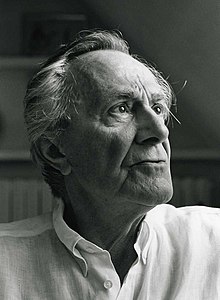Jean-François Lyotard
Jean-François Lyotard (French: [ʒɑ̃ fʁɑ̃swa ljɔtaʁ]; 10 August 1924 – 21 April 1998) was a French philosopher, sociologist, and literary theorist. His interdisciplinary discourse spans such topics as knowledge and communication, the human body, modernist and postmodern art, literature and critical theory, music, film, time and memory, space, the city and landscape, the sublime, and the relation between aesthetics and politics. He is best known for his articulation of postmodernism after the late 1970s and the analysis of the impact of postmodernity on the human condition. He was co-founder of the International College of Philosophy with Jacques Derrida, François Châtelet, and Gilles Deleuze.
Jean François Lyotard was born on August 10, 1924 in Vincennes, France to Jean-Pierre Lyotard, a sales representative, and Madeleine Cavalli. He went to primary school at the Paris Lycée Buffon and Louis-le-Grand. As a child, Lyotard had many aspirations: to be an artist, a historian, a Dominican monk, and a writer. He later gave up the dream of becoming a writer when he finished writing an unsuccessful fictional novel at the age of 15. Ultimately, Lyotard describes the realization that he would not become any of these occupations as "fate" in his autobiography called Peregrinations, published in 1986.
He studied philosophy at the Sorbonne in the late 1940s. His 1947 DES thesis (diplôme d'études supérieures, roughly equivalent to an MA thesis), Indifference as an Ethical Concept (L'indifférence comme notion éthique), analyzed forms of indifference and detachment in Zen Buddhism, Stoicism, Taoism, and Epicureanism. After graduation, he held a research post at France's National Center for Scientific Research. In 1950, Lyotard took up a position teaching philosophy in Constantine in French Algeria. In 1971, Lyotard earned a State doctorate with his dissertation Discours, figure under Mikel Dufrenne—the work was published the same year. He married his first wife, Andree May, in 1948 with whom he had two children, Corinne and Laurence, and later married for a second time in 1993 to Dolores Djidzek, the mother of his son David (born in 1986).
...
Wikipedia

